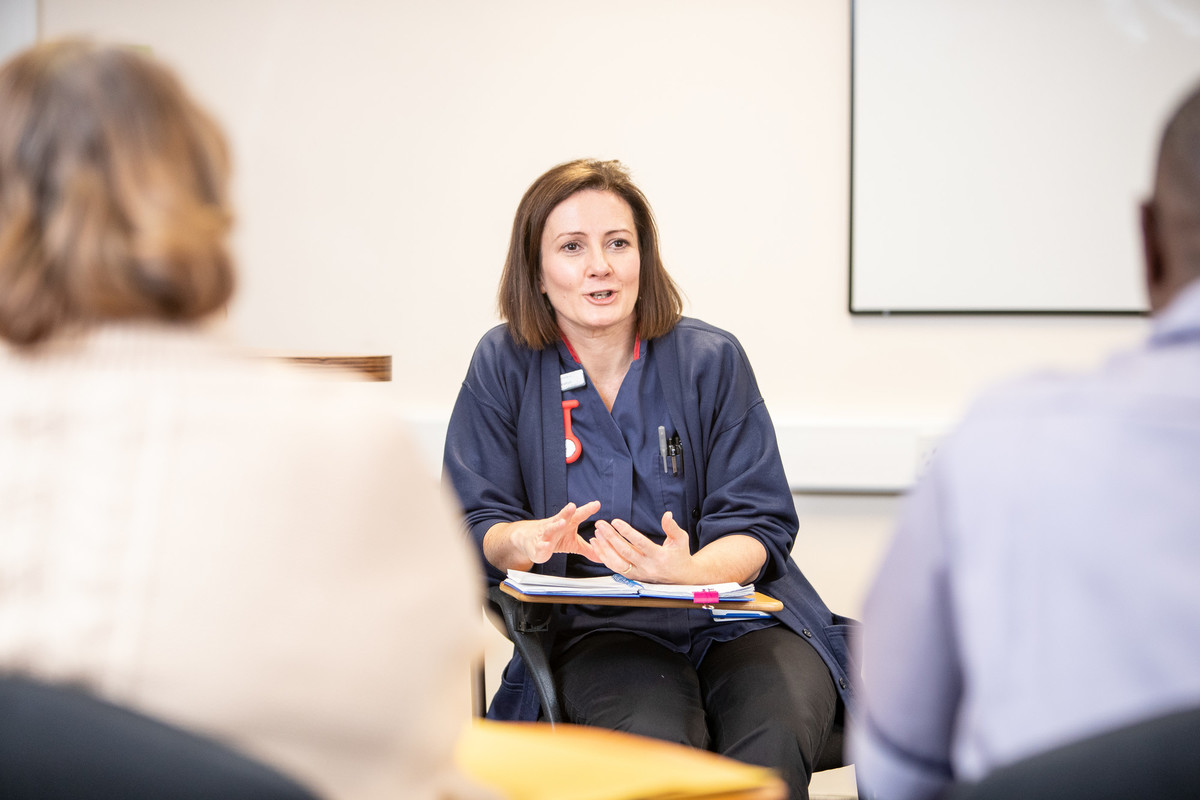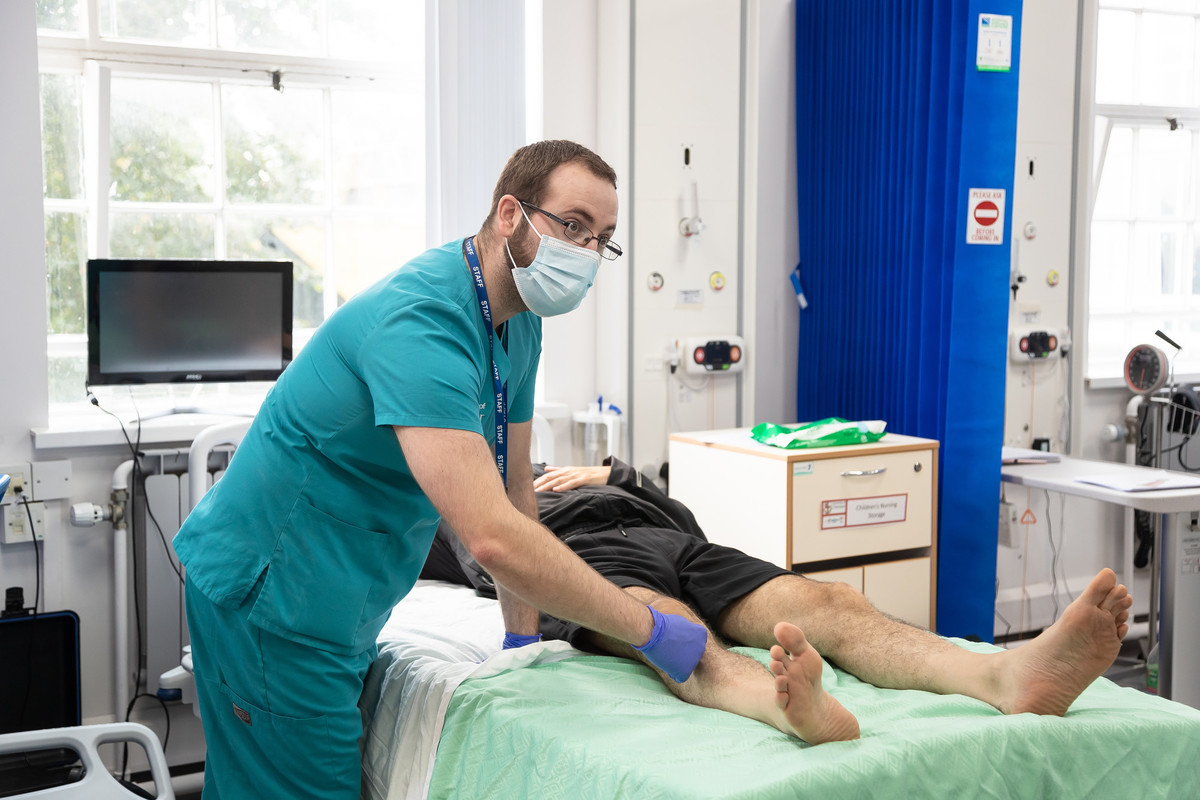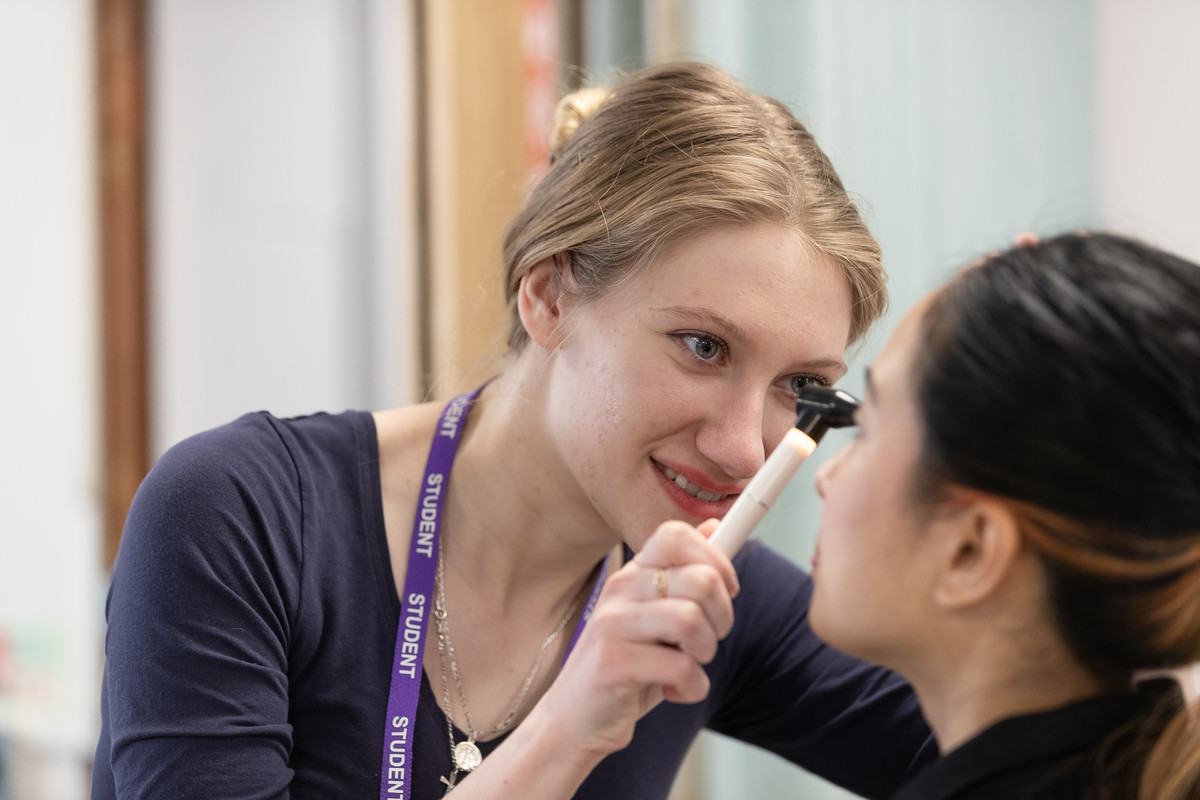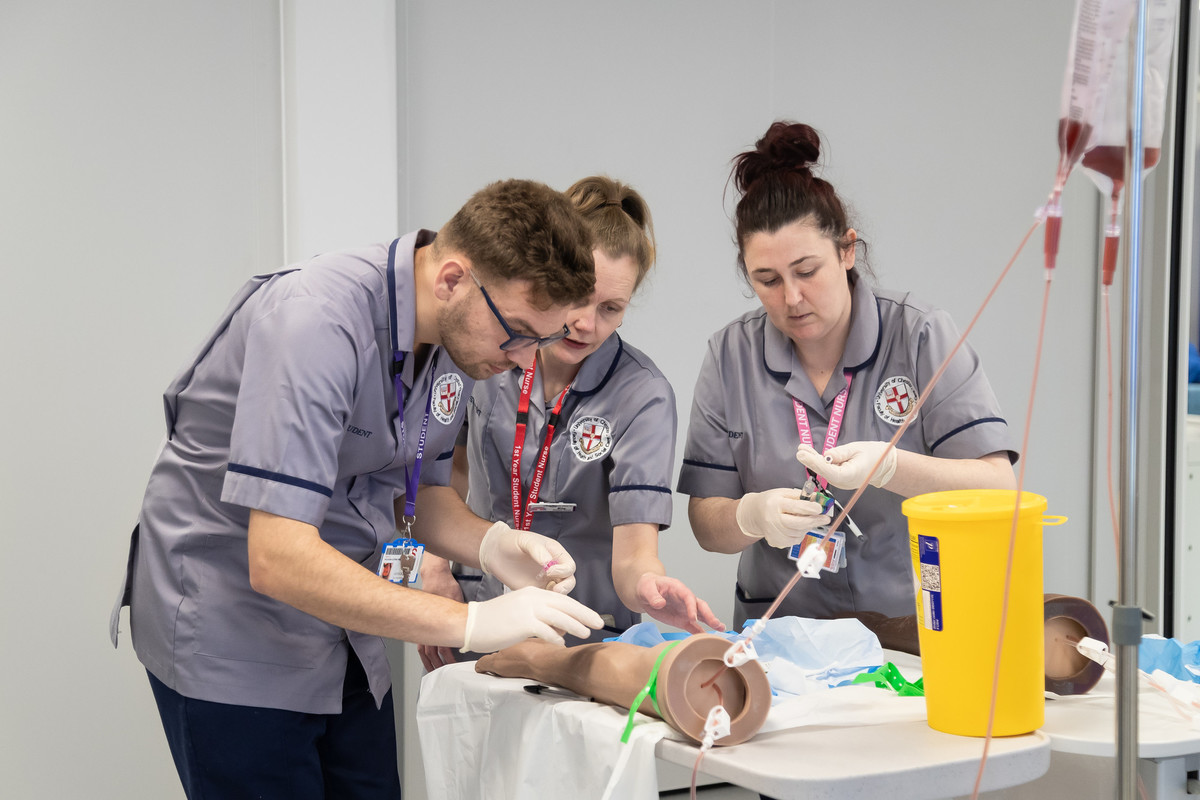Advanced Clinical Practice Apprenticeship MSc

Accreditations
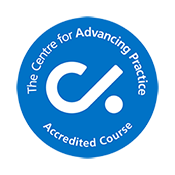
You are viewing Course summary
Course Summary
To prepare Allied Health Professionals, Nurses, Midwives and Pharmacists to practice as Advanced Clinical Practitioners as defined by Health Education England (2017).
Our dedicated advanced clinical practice academic team are all clinical ACPs as well as academics and as such we are able to ensure clinical currency in the way our modules are delivered.
The MSc Advanced Clinical Practice course at the University of Chester is accredited with NHS England. This means that on completion of the course our students will be eligible to receive a digital badge as recognition of their learning and professional development. Our programme has been reviewed and redesigned in conjunction with current students, advanced clinical practitioners (ACPs), clinical practice leads and service users, which has enabled us to create a programme that is contemporary and fit for purpose.
Our team are all ACPs and educators. 80% of the programme team still work clinically in ACP roles, bringing up-to-date clinical experience to the sessions, modules and programme that we deliver. We also have a dedicated service user team, who provide teaching and assessment.
What you'llStudy
The first year is predominantly the clinical year. We introduce the four pillars of advanced practice as defined by HEE (2017). We will also cover A&P, history taking, clinical examination and the use of diagnostics to determine possible differential diagnosis.
Most of our students choose to complete Non-medical Prescribing during the second year as their 40 credit option modules. We launch the clinical dissertation in year 2, which includes the creation of a clinical portfolio.
The clinical dissertation continues into the final year and covers all four pillars of advanced practice. The final module is to enable students to transition into their ACP roles and includes writing for publication, presenting skills, engaging in research and advanced communications.
Module content:
Project details including description, rationale and aims are specified in the Project Learning Agreement.
Module aims:
The aims of this module are:
- To provide an opportunity for learning to be achieved in the work context.
- To facilitate strategic development within the work place for the mutual benefit of employer and employee.
- To enable students to use the knowledge and skills gained through theoretical study in a practical situation.
- To provide a mechanism that enables HE to work in partnership with external organisations to design and deliver modules, which meet specific needs efficiently and economically.
- To engender in students a sympathetic understanding of the method of operation of the reflective practitioner.
Module content:
Module aims:
|
Module content:
Module content will include:
- Defining the topic area; Rationale for choice.
- Learning contract negotiation, Action planning and goal setting, Assignment guidance.
- Guidance for critical analysis of topic area, and the implications for clinical practice
- Literature and information retrieval, the use of the literature for critical analysis, evaluation and synthesis.
- Management of self-directed study; time management.
- Currency of literature sources, the meaning of creative and innovative practice; contemporaneous thinking.
- Application of theory to practice; suggestions for future development, strategies for future practice.
Module aims:
The aims of this module are:
- To enable students to critically analyse a topic relevant to their practice area in depth, using an action plan, and to justify strategies for future practice.
- To enable the student to expand and develop their knowledge of an area of interest relevant to their clinical practice.
Module content:
The RPS (2021) generic Prescribing Competency Framework forms the basis of the curriculum and has been used to inform the design and delivery of the programme acting as a contextual framework to structure learning and assessment for all students regardless of their professional background.
THE CONSULTATION (COMPETENCIES 1-6)
1: ASSESS THE PATIENT
Undertakes an appropriate clinical assessment, including a medical, social and medication history including allergies and intolerances and refers to or seeks guidance from another member of the team, a specialist or a prescribing information source when necessary.
Accesses and interprets all available and relevant patient records including relevant investigations necessary to inform treatment options by systematically considering a working or final diagnosis. Understands the condition(s) being treated, their natural progression and how to assess their severity, deterioration and anticipated response to treatment including adherence to and effectiveness of current medicines.
2: CONSIDER THE OPTIONS
Considers both non-pharmacological (including no treatment) and pharmacological approaches to modifying disease and promoting health, including pharmacological treatment options such as optimising doses as well as stopping treatment (appropriate polypharmacy, de-prescribing). Assessing the risks and benefits to the patient/service user of taking or not taking a medicine or treatment. Applies understanding of the mode of action and pharmacokinetics of medicines and how these may be altered taking into account any relevant patient factors and the potential impact on route of administration and formulation of medicines.
Identifies, accesses, and uses reliable and validated sources of information and critically evaluates other information. Stays up-to-date in own area of practice and applies the principles of evidence-based practice, including clinical and cost-effectiveness, taking into account the wider perspective including the public health issues related to medicines and their use and promoting health and understanding of antimicrobial resistance and the roles of infection prevention, control.
3: REACH A SHARED DECISION
Works with the patient/carer in partnership to make informed choices, agreeing a plan that respects patient preferences including their right to refuse or limit treatment, identifying and respects the patient/service user in relation to diversity, values, beliefs and expectations about their health and treatment with medicines.
Routinely assesses adherence in a non-judgemental way and understands the different reasons non-adherence can occur and how best to support patients/carers. Building a relationship which encourages appropriate prescribing which explores the patient/service users/ carers understanding of a consultation and aims for a satisfactory outcome for the patient/carer and prescriber.
4: PRESCRIBE
Prescribes a medicine with up-to-date awareness of its actions, indications, dose, contraindications, interactions, cautions, and unwanted effects. Understands the potential for adverse effects and takes steps to avoid/minimise, recognise and manage them. Prescribes within relevant frameworks for medicines use as appropriate. Prescribes generic medicines where practical and safe for the patient and knows when medicines should be prescribed by branded product.
Understands and applies relevant national frameworks for medicines use to own prescribing practice. Accurately completes and routinely checks calculations relevant to prescribing and practical dosing. Considers the potential for misuse of medicines, Uses up-to-date information about prescribed medicines. Only prescribes medicines that are unlicensed, ‘off-label’, or outside standard practice if satisfied that an alternative licensed medicine would not meet the patient’s clinical needs.
Electronically generates or writes legible unambiguous and complete prescriptions and contemporaneous records and clinical notes of prescribing decisions. Communicates information about medicines and what they are being used for when sharing or transferring prescribing responsibilities/ information.
5: PROVIDE INFORMATION
Checks the patient/service user/carer’s understanding of and commitment to the patient’s management, monitoring and follow-up giving clear and accessible information about their medicines, and how to identify reliable sources of information about their medicines and treatments.
Ensures that the patient/service user/carer knows what to do if there are any concerns about the management of their condition, if the condition deteriorates or if there is no improvement in a specific time frame and where possible, encourages and supports patients/service users/carers to take responsibility for their medicines and self-manage their conditions.
6: MONITOR AND REVIEW
Establishes and maintains a plan for reviewing the patient’s/service user treatment, ensuring that the effectiveness of treatment and potential unwanted effects are monitored. Detects and reports suspected adverse drug reactions using appropriate reporting systems, adapting management plans in response to on-going monitoring and review of the patient’s/service users condition and preferences.
PRESCRIBING GOVERNANCE (COMPETENCIES 7-10)
7: PRESCRIBE SAFELY
Prescribes within own scope of practice, recognising any limitations of own knowledge and skill including common types and causes of medication errors and how to prevent, avoid and detect them. Identifies the potential risks associated with prescribing via remote technology taking steps to minimise risk to support safe prescribing. Reporting prescribing errors, near misses and critical incidents, reviewing practice to prevent recurrence.
8: PRESCRIBE PROFESSIONALLY
Maintains confidence and competence to prescribe, accepting accountability and responsibility for prescribing, understanding legal and ethical implications including regulatory frameworks.
Makes prescribing decisions based on the needs of patients, recognising and dealing with factors that might unduly influence prescribing by working within the NHS/organisational/regulatory and other codes of conduct when interacting with the pharmaceutical industry.
9: IMPROVE PRESCRIBING PRACTICE
Reflects on own and others prescribing practice, and acts upon feedback and discussion, including colleagues’ inappropriate or unsafe prescribing practice using appropriate mechanisms. Understands and uses available tools to improve prescribing.
10: PRESCRIBE AS PART OF A TEAM
Acts as part of a multidisciplinary team to ensure that continuity of care across care settings is developed and not compromised, establishing relationships with other professionals based on understanding, trust and respect. Negotiates the appropriate level of support and supervision for role as a prescriber and provides support and advice to other prescribers or those involved in administration of medicines.
Module aims:
The aim of this module is to enable the autonomous professional to attain the competencies as identified by the Royal Pharmaceutical Society (2021) Framework for safe effective prescribing practice.
Module content:
- Local, national policies and procedures within scope of students own area of practice, professional and regulatory codes of own and others practice, professional boundaries, range of physical, psychological, pharmacological, diagnostic and therapeutic interventions applied to scope of students own practice.
- History taking, holistic examination, requesting and interpreting diagnostic tests, physical, psychological and population based assessment methods
- Risk assessment and risk management techniques, communication strategies, principles and practice pf health promotion and prevention, appropriate risk assessment and management tools and their application to own area of practice.
- Care planning and evaluation, care pathways, discharge and referral, multi and inter agency communication, local and national policies, regulatory frameworks, guidelines for prescribing
- Clinical supervision, reflection, motivational theory applied to self and others, leadership theories, importance of peer review and evaluation
- Application of teaching and learning theories and models of care, organisational and professional roles and responsibilities
- Change management approaches, identifying , critiquing and applying relevant literature to own area of practice, service evaluation and audit.
Module aims:
The aim of this module is to enable students to demonstrate achievement of the Advanced Clinical Practitioner Apprenticeship Standards (Institute for Apprenticeships, 2018) and prepare and undertake the end point assessment (the final part of the Integrated Degree Apprenticeship for the Advanced Clinical Practitioner).
Module content:
The module content will include:
Portfolio development which will include key systems / conditions as applied to own clinical area, decision making as an Advanced Practitioner, critical reflection
Apply research pillar to own clinical area by exploring how to identify gaps in evidence, evaluate clinical practice, address gaps and disseminate findings
Apply education pillar to own clinical area by identifying way to facilitate learning and assessment through role modelling and team working
Apply leadership pillar to own clinical area by evaluating self, others and service effectiveness to influence practice and enhance quality. Consider service redesign solutions implementation methods.
Module aims:
This module aims to provide students with an opportunity to demonstrate achievement and critically reflect upon the four pillars of Advanced practice, clinical, leadership, research and education contextualised to their own clinical practice.
Module content:
The module content will include:
History of Advanced Clinical Practice, increased level of responsibility, self- awareness and team working, key documents, legal frameworks (including HEE framework to promote person centered approaches in health and care, Introduction to the four pillars of advanced clinical practice -
- Critiquing evidence to aid clinical practice (research pillar)
- Influencing clinical practice to enhance quality and adoption of best practice (leadership)
- Critical reflection to aid individual and wider team developmental needs (education)
- Exploration of why advanced A&P and pathophysiology knowledge important for advanced level practice (clinical)
Legal and professional consideration in advance clinical practice. Professional requirements for lifelong learning and for promoting learning in others.
Principles of evidence-based practice, types of knowledge. literature searching. Constructing an argument. Service user as expert and shared decision making, person centred care.
Anatomy, Physiology and & Pathophysiology of the major body systems – considering application to practice.
Individual and population influencing factors eg lifestyle, ethnicity. Impact of health inequalities. Health promotion and disease prevention.
Module aims:
The aim of this module is to enable the trainee advanced clinical practitioner to develop the core knowledge required for advanced level clinical practice.
Module content:
The module content will include:
- Formulating differential diagnosis (Ear Nose & Throat, Respiratory, Cardiovascular, Gastrointestinal, Mental Health) using advanced communication, history taking, clinical examination, diagnostics, – to develop patient centred management plans including safety netting and collaboration with others (Health Education England’s framework to promote person-centered approaches in health and care.)
- Interpreting the evidence to justify clinical decisions made and to ensure best practice is delivered and shared widely in day to day Advanced Clinical Practitioner (ACP) roles. Be able to identify gaps within the evidence available and consider how these may be addressed
- Working in partnership to understand the influences of individuals, society and communities on health and access to health care services
- Explore role modelling to ensure care that is delivered by all is safe and evidence-based
Module aims:
The aims of the module are:
To prepare the learner to perform clinical consultations to determine and justify differential diagnosis
To prepare the learner to ensure decisions made and care given is evidence based ensuring any gaps in evidence are identified and addressed
Work collaboratively with service users to understand the factors that affect their individual health care needs
Module content:
The module content will include:
- Formulating differential diagnosis (Integumentary, Musculoskeletal, Neurology, Endocrine, Renal) using advanced communication, history taking, clinical examination, diagnostics, – to develop patient centred management plans including safety netting and collaboration with others (Health Education England’s framework to promote person-centered approaches in health and care.)
- Interpreting the evidence to justify clinical decisions made and to ensure best practice is delivered and shared widely in day to day Advanced Clinical Practitioner (ACP) roles. Be able to identify gaps within the evidence available and consider how these may be addressed
- Explore how to evaluate the impact of the ACP role and clinical decisions made on the service as a whole and on quality of care provided
Module aims:
The aims of the module are:
To prepare the learner to perform clinical consultations to determine and justify differential diagnosis
To prepare the learner to ensure decisions made and care given is evidence based ensuring any gaps in evidence are identified and addressed
To understand the impact of the ACP role on quality of services delivered
Students will experience a variety of teaching and learning methods designed to facilitate the achievement of all learning outcomes at Masters level within a student-centred approach which fosters personal and professional development. Supervised practice with a designated clinical assessor is a mandatory part of the programme. There will also be consultation-style workshops utilising ‘real life’ scenarios, technology enhanced and simulation-based learning.
Self-directed and peer-learning will be encouraged throughout and, consistent with the philosophy of the programme, peer and self-assessment will be used in the formative assessment process to complement lecturer assessment. Student support and direction will be provided by interactive discussion and individual feedback.
There is an expectation that students will be granted 7.5 hours (1 day) of study leave per week from their employers to attend university or complete the clinical competency achievement.
Summative assessments include:
- Objective Structured Clinical Examination (OSCE) of communication, clinical examination and clinical decision making skills
- Clinical Competency achievement, assessed by Clinical Assessor
- Academic written assignments
- Academic written dissertation
- Written and online examinations
- Oral presentation
- Oral examination
Entry Requirements
- We ask for a Level 2 Maths and English GSCE at C/4 or the achievement of a GCSE equivalent such as Level 2 Functional Skills.
- You need to have successfully completed degree-level academic modules.
- You need to have a current registration with one of the statutory regulators of health and care professions.
- We usually ask for a minimum of two years’ post-registration experience.
This course is not available to international students.
Fees and Funding
£1,040 per 20 credit module (2024/25)
Maximum funding for this apprenticeship at the University of Chester is currently £12,000.
Apprenticeships are funded by employers. For levy paying employers (organisations with a pay bill of over £3m per year), the total cost of the course will be directly met through levy contributions in the employer’s digital account.
For non-levy employers (organisations with a pay bill of less than £3m per year) there are other funding options. Please contact us for support and guidance on the options available.
Your course will involve additional costs not covered by your tuition fees. This may include books, printing, photocopying, educational stationery and related materials, specialist clothing, travel to placements, optional field trips and software. Compulsory field trips are covered by your tuition fees.
If you are living away from home during your time at university, you will need to cover costs such as accommodation, food, travel and bills.
The University of Chester supports fair access for students who may need additional support through a range of bursaries and scholarships.
Full details, as well as terms and conditions for all bursaries and scholarships can be found on the Fees & Finance section of our website.
Your Future Career
Job Prospects
To prepare Allied Health Professionals, Nurses, Midwives and Pharmacists to practice as Advanced Clinical Practitioners as defined by Health Education England (2017).
Our dedicated advanced clinical practice academic team are all clinical ACPs as well as academics and as such we are able to ensure clinical currency in the way our modules are delivered.
Careers service
The University has an award-winning Careers and Employability service which provides a variety of employability-enhancing experiences; through the curriculum, through employer contact, tailored group sessions, individual information, advice and guidance.
Careers and Employability aims to deliver a service which is inclusive, impartial, welcoming, informed and tailored to your personal goals and aspirations, to enable you to develop as an individual and contribute to the business and community in which you will live and work.
We are here to help you plan your future, make the most of your time at University and to enhance your employability. We provide access to part-time jobs, extra-curricular employability-enhancing workshops and offer practical one-to-one help with career planning, including help with CVs, applications and mock interviews. We also deliver group sessions on career planning within each course and we have a wide range of extensive information covering graduate jobs and postgraduate study.
